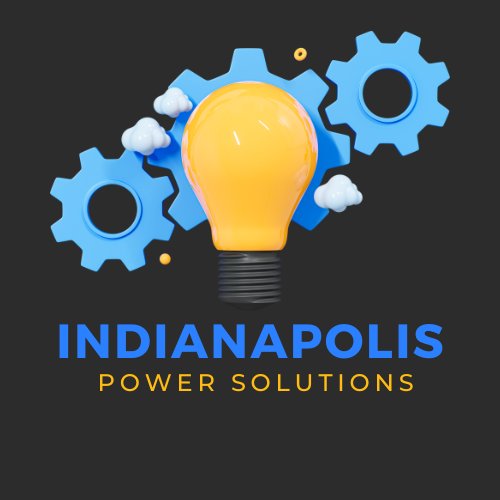
Whole House Generators in Mapleton IN
A whole house generator is a system designed to provide backup power to your entire home during an electrical outage. Unlike smaller, portable generators, a whole house generator is permanently installed outside your home and is connected directly to your electrical system. This ensures that all your appliances, lights, and heating or cooling systems continue to function seamlessly, even when the grid is down. Whole house generators come in various types, primarily categorized by their fuel sources:
- Natural Gas Generators: These units are connected to your home's natural gas supply, offering a continuous source of fuel as long as the gas lines are operational. They are a popular choice due to their convenience and lower operating costs.
- Propane Generators: Propane generators rely on fuel stored in tanks on your property. They are a good option if natural gas is not available but require regular refilling of the propane tanks.
- Diesel Generators: Known for their durability and power, diesel generators are often used for larger homes or commercial applications. They require more maintenance and are typically louder, but they offer robust performance.
How it Differs from Portable Generators
Whole house generators differ from portable generators in several key ways:
- Power Output: Whole house generators are designed to handle the electrical load of an entire home, whereas portable generators are usually limited to powering a few essential items.
- Installation: Whole house generators are permanently installed and automatically start when the power goes out, while portable generators need to be manually set up and connected to appliances.
- Fuel Source: Whole house generators typically run on natural gas or propane, ensuring a more consistent fuel supply. Portable generators often rely on gasoline, which can be more volatile and requires frequent refueling.

We will get back to you as soon as possible.
Please try again later.
Professional Installation vs. DIY
While it may be tempting to install a whole house generator yourself, professional installation is highly recommended. Certified technicians ensure that the generator is properly connected to your home's electrical system and that it complies with local building codes. They also handle the complex tasks of setting up the transfer switch and testing the system for proper operation. DIY installation could lead to safety hazards and may void warranties.
Maintenance and Troubleshooting
Maintaining your whole house generator is crucial for ensuring its reliability. Regular maintenance includes:
- Routine Inspections: Check the generator's oil levels, coolant levels, and overall condition regularly.
- Battery Checks: Ensure the battery is charged and in good condition.
- Exercise Runs: Most generators need to be run periodically to keep the system in working order.
If you encounter issues, consult the user manual or contact a professional technician for troubleshooting and repairs.
Long-term Savings and Investment Value
Investing in a whole house generator can lead to long-term savings and added value to your home. By preventing power outages, you avoid potential damage to appliances, loss of perishable food, and inconvenience. Additionally, whole house generators can increase your property value, making your home more attractive to potential buyers who value reliable power.
What are the Benefits
The benefits of having a whole house generator include:
- Uninterrupted Power Supply: Keep your home running smoothly during outages, maintaining comfort and security.
- Convenience: Automatic startup and integration with your home's electrical system mean you don't need to manually set up or refuel the generator.
- Increased Home Value: Homes with reliable backup power are often seen as more desirable.
What We Offer
We provide a range of services for
whole house generators in Mapleton, IN. Our offerings include:
- Residential Generators
- Commercial Generators
- Portable Generators
- Electric Generators
- Propane Generators
- Solar Generators
- Generator Repairs
- Generator Maintenance
- Generator Parts
How to Choose the Right Generator For Your House
Choosing the right whole house generator involves several considerations:
- Power Needs: Calculate the total wattage required to power your home’s essential systems and appliances.
- Fuel Type: Decide between natural gas, propane, or diesel based on availability and convenience.
- Budget: Consider both the initial cost and long-term operating expenses.
Consulting with a professional can help you determine the best generator for your specific needs and budget.
Importance of Reliable Power in Homes
Reliable power is essential for modern living. It ensures that you can continue with your daily activities without interruption, maintains the safety and security of your home, and protects your valuable appliances and food supplies. In areas prone to frequent outages, a whole house generator offers peace of mind and convenience.
Frequently Asked Questions (FAQs)
- 1. How long can a whole house generator run?
The run time depends on the fuel type and capacity of the generator. Typically, natural gas and propane generators can run indefinitely as long as the fuel supply is available, while diesel generators offer longer run times with proper maintenance.
- 2. Do I need a permit for installation?
Yes, most locations require permits for the installation of a whole house generator. Check with your local authorities to ensure compliance with regulations.
- 3. How often should I perform maintenance?
Routine maintenance should be performed according to the manufacturer's recommendations, usually every six months to a year.
For more information about whole house generators or to schedule a consultation, contact us today. Our team of experts is ready to help you find the perfect solution for your home's power needs. Invest in reliable power and enjoy uninterrupted comfort and security for your home.
Let's Connect!
Ensure your home stays powered. Our whole house generators are your best defense against unexpected outages, keeping your family safe and comfortable. Discover how whole house generators work and why they're crucial for your home. Check out our buyer's guide to find the perfect fit for your needs and protect against the common reasons for loss of power. Contact us now!